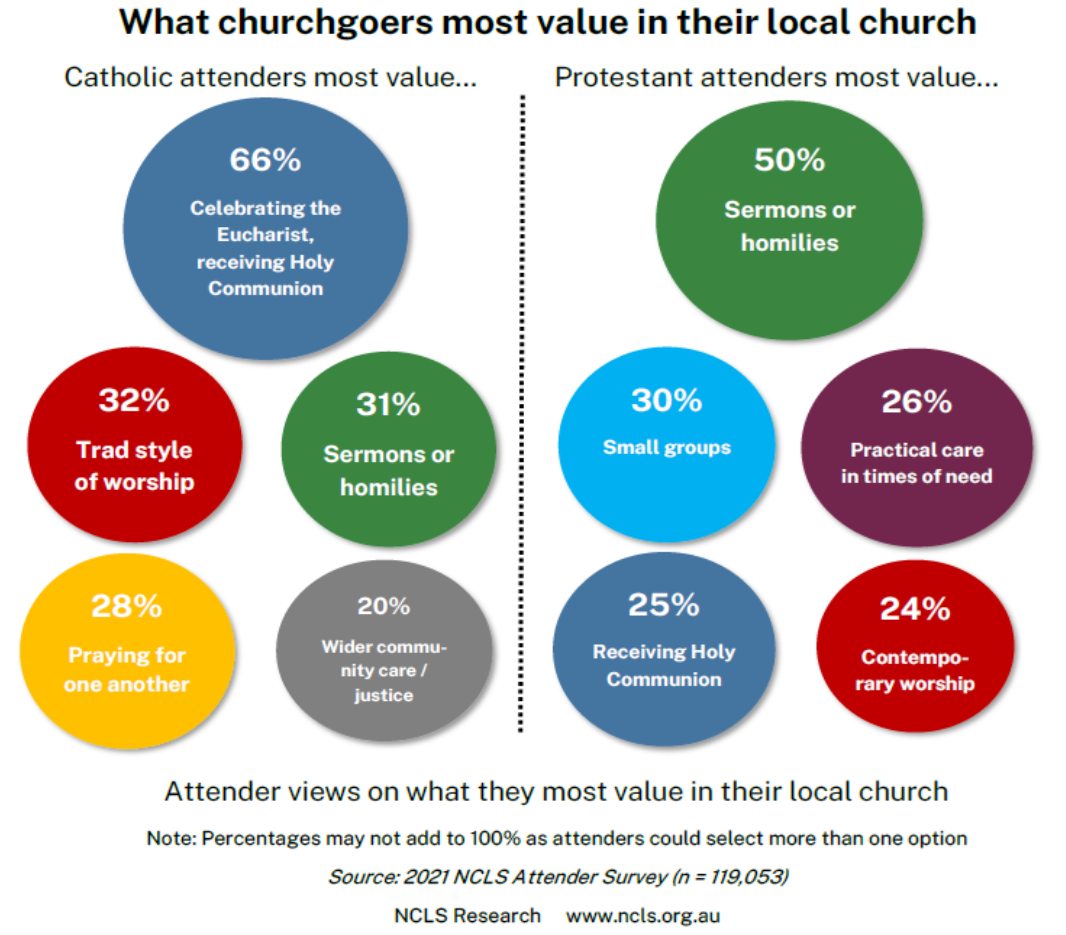If you’re a churchgoer, chances are there are multiple reasons why you regularly walk through the door. The 2021 National Church Life Survey has found that there are two main reasons that keep people coming back to church - preaching and Holy Communion. Furthermore, the denomination of your church is linked to what churchgoers value most.
Every National Church Life Survey (NCLS) asks Australian church attenders which aspects they most value in their local church. In the 2021 NCLS, church attenders were asked to select up to three aspects of their local church that they most valued, from a list of 13 options.
The aspects most valued by the largest numbers of churchgoers were sharing in Holy Communion/the Eucharist/the Lord’s Supper (43% of attenders), followed by sermons, homilies or Bible teaching (41% of attenders).
Differences between Catholic and Protestant attenders
These overall results mask strong differences between Catholic attenders and Protestant attenders. Celebrating the Eucharist/Holy Communion was most valued by 66% of Catholics, compared to only 25% of Protestant attenders. The reverse was true for sermons/homilies/preaching, which was most valued by only 31% of Catholics compared to 50% of Protestant attenders.

Denominational diversity in aspects most valued
New analysis of the 2021 NCLS data breaks these differences down even further. We group denominations into broad categories:
- Catholic
- Mainstream Protestant (e.g. Anglican, Uniting, Presbyterian and Lutheran)
- Pentecostals (e.g. Acts 2 Alliance, Acts Global, Australian Christian Churches, C3 Churches, CityLife Church, CRC International, International Network of Churches (INC), International Pentecostal Holiness Churches (IPHC).
- Large Protestant (e.g. Baptist, Churches of Christ, Salvation Army, Seventh-day Adventist)
- Other Protestant (e.g. Christian and Missionary Alliance, Christian Reformed Church, Fellowship of Independent Evangelical Churches (FIEC), Vineyard Churches.
Some variation within Protestant groupings was seen in the value of Holy Communion (35% of Mainstream Protestants, 14% of Pentecostals and 17% of other large Protestant denominations).
Little variation was seen across the four Protestant groupings in the value of sermons and preaching (48% of Mainstream Protestants, 51% of Pentecostals, 50% of Large Protestants and 54% of Other Protestants).
Among Catholic Mass attenders similar proportions most commonly valued traditional style of worship or music (32%), homilies (31%), and praying for one another (28%).
For Mainstream Protestants as a whole, sharing in Holy Communion, traditional worship, small groups, and practical care for one another, were all most valued by around a quarter of attenders.
For those in Pentecostal movements, after preaching, the most commonly valued aspects included contemporary worship (38%) and small groups (30%).
Among Large and Other Protestant movements, attenders were more likely to also value small groups and wider community care/justice emphasis than other denominational groups.
The table below provides more detail of the different aspects personally valued by attenders across denominational groups from the 2021 National Church Life Survey.
| Table: Aspects of church most valued: denominational differences in 2021 | ||||||
|---|---|---|---|---|---|---|
| Denomination Type | Total | |||||
| Catholic |
Mainstream Protestant |
Large Protestant | Other Protestant | Pentecostal | ||
| % | % | % | % | % | % | |
| Sharing in Holy Communion | 66 | 35 | 17 | 14 | 17 | 43 |
| Sermons, preaching or teaching | 31 | 48 | 50 | 54 | 51 | 41 |
| Praying for one another | 28 | 22 | 24 | 22 | 25 | 25 |
| Traditional style of worship or music | 32 | 28 | 16 | 7 | 5 | 24 |
| Practical care in times of need | 18 | 27 | 27 | 23 | 25 | 22 |
| Wider community care / justice emphasis | 20 | 20 | 24 | 27 | 21 | 21 |
| Small groups: prayer, discussion, Bible | 7 | 28 | 31 | 37 | 30 | 20 |
| Contemporary style of worship or music | 13 | 18 | 22 | 26 | 38 | 19 |
| Ministry to children or youth | 7 | 16 | 22 | 24 | 20 | 14 |
| Social activities or meeting new people | 11 | 13 | 14 | 12 | 17 | 13 |
| Openness to social or cultural diversity | 14 | 10 | 10 | 13 | 10 | 12 |
| Reaching those who do not attend church | 7 | 11 | 16 | 18 | 19 | 11 |
| Presence of a church school or pre-school | 11 | 3 | 4 | 7 | 2 | 6 |
| Attenders could select up to three options. Percentages will not add up to 100%. Source: 2021 NCLS Attender Survey |
||||||



